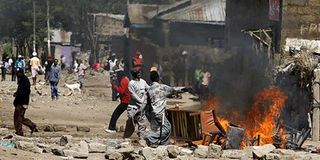Breaking News: Old Kijabe dam tragedy: Death toll rises to 45
I’ve a watertight case, says Ocampo

Armed youths in Naivasha at the height of the post-election violence in 2008. Photo/FILE
International Criminal Court chief prosecutor Luis Moreno-Ocampo says he has lined up insider witnesses who will prove the case against all six suspects accused of crimes against humanity in The Hague.
Mr Moreno-Ocampo said celebrations in the defence camps due to a perception that he did not conduct sufficient investigations were premature.
The prosecutor said he had adopted a deliberate strategy of holding back some of his most crucial pieces of evidence to protect witnesses. (Read: Hearings procedure at the ICC)
Mr Moreno-Ocampo said the bulk of his witnesses were insider witnesses or what he called “crime-based witnesses”.
These are individuals who may have been part of the groups that committed the crimes but later decided to assist the prosecution.
Others may be individuals who held positions within the government or other party organs but later decided to switch sides and work with the prosecution.
The prosecutor said it would have been an error to expose these individuals at this stage because that would effectively have opened them to the danger of reprisals in case the charges were dismissed at the pre-trial stage.
“The prosecution does not want to protect individuals for only two years and then let them go.”
Mr Moreno-Ocampo said his reliance on some public sources of information at the pre-trial stage would give way to a more robust presentation of evidence including by individuals with direct knowledge of the case.
“We have great evidence. This includes details of meetings that planned the attacks. It is understandable (some think we have not produced enough evidence). But the crime-based witnesses will come in later. For national investigations you come in first with crime-based witnesses and later rely on other sources. Here we have decided to do it the other way round.”
The defence team of Eldoret North MP William Ruto was particularly seen as having concentrated their strategy on illustrating their view that Mr Moreno-Ocampo did not conduct sufficient investigations and lacked a case meriting consideration at full trial stage.
The prosecutor said this strategy would be shown to be flawed. He said he had witnesses willing to demonstrate that all six suspects participated in the violence.
In the case of Head of Public Service Francis Muthaura, Finance minister Uhuru Kenyatta and Postmaster general Hussein Ali, Mr Moreno-Ocampo said he would prove in the course of the pre-trial hearings that they participated in planning the violence.
He spoke of two meetings at State House – on December 30, 2007, and January 3, 2008, where the plan to attack Naivasha was allegedly conceived and planned.




